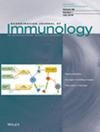特应性皮炎的病理免疫学机制:人类三大微生物群的作用
IF 1.6
4区 医学
Q2 IMMUNOLOGY
引用次数: 0
摘要
特应性皮炎(AD)是一种遗传易感性过敏性炎症皮肤病,具有慢性、瘙痒和反复发作的特点。特应性皮炎患者皮肤干燥、瘙痒,常伴有慢性湿疹、过敏性鼻炎或哮喘,对患者的日常生活造成很大影响。随着基因组测序技术的发展,微生物已被证明与这种疾病有关,而与 AD 相关的微生物正引起研究人员的极大关注。近年来,越来越多的研究表明,AD 患者体内微生物组失衡对疾病预后有很大影响,其原因与各种免疫机制密切相关。然而,人们对微生物参与 AD 发病机制的情况仍然知之甚少。在本文中,我们回顾了皮肤微生物组、肠道微生物组和肺微生物组的免疫机制与AD预后和免疫治疗方案相关的研究进展。希望这种研究方法能为探索多发性硬化症的发病机制和新兴治疗方法奠定基础。本文章由计算机程序翻译,如有差异,请以英文原文为准。
Patho‐immunological mechanisms of atopic dermatitis: The role of the three major human microbiomes
Atopic dermatitis (AD) is a genetically predisposed allergic inflammatory dermatosis with chronic, pruritic, and recurrent features. Patients with AD have dry and itchy skin, often accompanied by chronic eczematous lesions, allergic rhinitis, or asthma, which has a considerable impact on their daily lives. With advances in genome sequencing technology, it has been demonstrated that microorganisms are involved in this disease, and the microorganisms associated with AD are attracting considerable research attention. An increasing number of studies conducted in recent years have demonstrated that an imbalanced microbiome in AD patients has substantial impact on disease prognosis, and the causes are closely tied to various immune mechanisms. However, the involvement of microorganisms in the pathogenesis of AD remains poorly understood. In this paper, we review the advances in research on the immunological mechanisms of the skin microbiome, intestinal microbiome, and lung microbiome that are related to AD prognosis and immunotherapy protocols. It is hoped that this approach will lay the foundation for exploring the pathogenesis of and emerging treatments for AD.
求助全文
通过发布文献求助,成功后即可免费获取论文全文。
去求助
来源期刊
CiteScore
7.70
自引率
5.40%
发文量
109
审稿时长
1 months
期刊介绍:
This peer-reviewed international journal publishes original articles and reviews on all aspects of basic, translational and clinical immunology. The journal aims to provide high quality service to authors, and high quality articles for readers.
The journal accepts for publication material from investigators all over the world, which makes a significant contribution to basic, translational and clinical immunology.

 求助内容:
求助内容: 应助结果提醒方式:
应助结果提醒方式:


